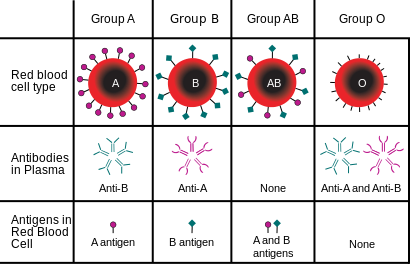Why are people with blood type O-negative called "universal donors" and why are people with blood type AB-positive called "universal recipients"?
1 Answer
O- has no antigens or Rh protein, while AB+ has both.
Explanation:
There are three things that determine a persons blood type:
1. Presence of A antigen
2. Presence of B antigen
3. Presence of Rh Protein
If a person has only A antigen, they are type A. If only B antigen, type B. Both, type AB. Neither, type O. If a person has the Rh Protein, they are positive, and if not, they are negative. So, if a person has all three things mentioned above, they are AB-positive, and if a person has none, they are O-negative. Here's a picture showing blood types.
 New Health Guide
New Health Guide
If a person is given blood that has an antigen that they do not have, their body will think that it is a foreign object because their blood contains antibodies that will attack the new cells. An immune response will occur, which can kill a person. The same thing happens with the Rh protein.
However, if a person already has all the antigens and the protein, as people with AB-positive do, their body will accept the new blood will no matter what, since their body recognizes everything on the new blood cells. Therefore, type AB-positive is the universal recipient because their body recognizes both antibodies and the protein.
This works the opposite way too. If you have type A blood and are given type O, your body won't have a reaction since it can't see anything on the blood cells that could be marked as foreign. The same goes for the protein. So, since people with O-negative have nothing on their blood cells, anyone will be able to receive their blood and not have a reaction. For that reason, they are called universal donors.

